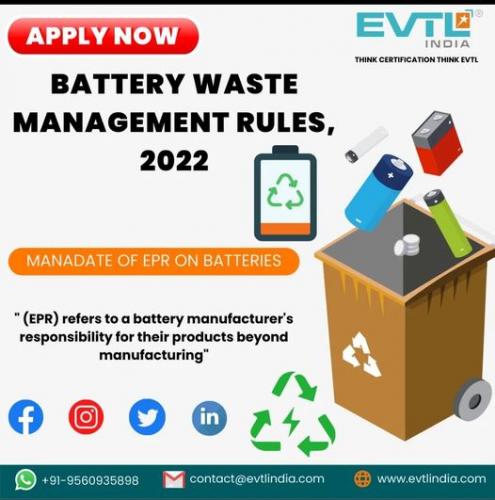Battery EPR and the Importance of Consulting with a Battery EPR Consultant

Batteries are an essential component in many industries, including automotive, electronics, and renewable energy. However, they also pose environmental and safety risks when improperly disposed of or mishandled. To address these issues, many countries have implemented Extended Producer Responsibility (EPR) programs, which hold battery producers responsible for the collection, recycling, and disposal of their products. In this blog, we'll discuss what Battery EPR is, the Battery EPR process, and why it's crucial to consult with a Battery EPR consultant.
What is Battery EPR?
Extended Producer Responsibility (EPR) is a policy that holds manufacturers responsible for managing the end-of-life disposal of their products. Battery EPR applies to all types of batteries, including automotive, industrial, and consumer batteries. Under Battery EPR programs, battery manufacturers are responsible for the collection, treatment, and recycling of their products. This policy ensures that batteries are handled safely and properly disposed of, minimizing environmental risks.
Battery EPR Process:
The Battery EPR process involves several steps, including collection, sorting, transportation, and recycling. Battery manufacturers must establish collection networks and provide collection bins at designated locations, such as retail stores or waste management facilities. The collected batteries are then sorted by type and transported to recycling facilities. At the recycling facility, the batteries undergo a series of processes to recover valuable materials such as lithium, cobalt, and nickel. These materials can then be used to produce new batteries, reducing the need for mining raw materials.
Battery EPR
Consultant:
Battery EPR is a complex process that requires expertise in battery technology, waste management, and environmental regulations. A Battery EPR consultant can help battery manufacturers navigate the complexities of the Battery EPR process and ensure compliance with environmental regulations. A Battery EPR consultant can also provide guidance on implementing sustainable battery design, reducing waste, and improving the recycling efficiency of batteries.
Conclusion:
Battery EPR is a critical policy that ensures the safe and proper disposal of batteries, minimizing environmental and safety risks. The Battery EPR process involves several steps, including collection, sorting, transportation, and recycling. A Battery EPR consultant can help battery manufacturers navigate the complexities of the Battery EPR process and ensure compliance with environmental regulations. It's crucial for battery manufacturers to consult with a Battery EPR consultant to implement sustainable battery design, reduce waste, and improve recycling efficiency.
Post Your Ad Here
Comments